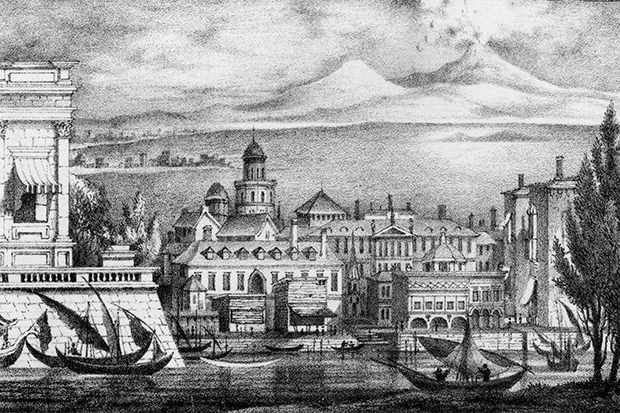The Grand Tour usually culminated with Naples, ragamuffin capital of the Italian south, where Vesuvius offered a visual education in the grand style. Some Grand Tourists, among them Lord Byron, got as far as Greece; but Italy was coveted as the glittering birthplace of the Renaissance — a haven of art on the Arno. In some ways, then, Britain became civilised through its contact with Italy. ‘A man who has not been to Italy,’ Samuel Johnson observed in 1776 (perhaps ironically), ‘is always conscious of an inferiority.’
The grand habit of touring the Continent for its art and classical antiquity flourished from the mid-17th century until the advent of rail transport in the 1840s. Though trains were often of a biblical slowness and unreliability (not least in Italy), they spelled the end of solitary aristocratic travel. The Grand Tour was overwhelmingly the preserve of nobility and landed gentry. Accompanied by a Cicerone (scholarly guide), young men embarked on their educational rite of passage through the gracious suavities of Paris and on south across the Alps to Italy, where the liquid softness of the Mediterranean worked on them like a soporific.
Today, sadly, Naples serves merely as a springboard for those visiting the lava-trapped civilisations of Pompeii and Herculaneum. Tourists are put off by the presence of the Neapolitan Mafia — the Camorra —and the dark, corridor-like streets strewn with litter. Naples always did have a disreputable edge. (A Neapolitan gambling manual advises: ‘Rule Number One — always try to see your opponent’s cards.’)
Without the crowds of camera-clicking tourists, however, one is able to visit Naples today as a Grand Tourist might have done in the 18th century: alone. The city, one-time Arcady of Bourbon kings and queens, remains a glory.
Sex, gambling and drinking were all part of the Grand Tour experience. Florence, for all its Medicean splendour, was viewed as a sodomitical hotbed where the ‘Italian vice’ of homosexuality was, as it were, rampant. In 1641 the Old Etonian chemist and philosopher Robert Boyle claims to have been harassed by bisexual friars in a Florence brothel (‘gowned sodomites’, he called them, with ‘goatish heats’). Those in England might have thought Boyle had it coming. A Protestant milord travelling through papal lands during the Reformation was bound to get poxed and pillaged, or at best swindled. To be loyal to England meant to stay at home.
Italy presented a civilisation in ruins. Typically the Grand Tourist visited the Colosseum, the Forum and, finally, Pompeii. Large parts of Pompeii had remained buried until 1748, when the Neapolitan authorities excavated what turned out to be shops, brothels, inns and stables. (Incredibly, only half of Pompeii has so far been uncovered.) English milordi must have thrilled at the sight of excavators dredging carbonised bars of soap, rope-soled shoes, dates, olives, onions and phalluses carved into stonework (oddly resembling the ithyphallic symbols spray-gunned today on the walls of Naples).
What we know of everyday life in ancient times derives largely from Pompeii, so a visit to the ash-solidified town was essential if the Grand Tourist was to demonstrate a classical education acquired abroad. The ruts worn by wagon-wheels in the streets of Pompeii, its baths and buried villas brought Roman Italy thrillingly to life. Up Pompeii, down Pompeii: the town was a delight.






Comments